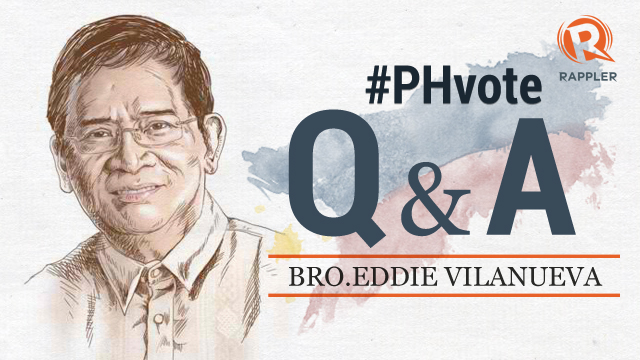SUMMARY
This is AI generated summarization, which may have errors. For context, always refer to the full article.

MANILA, Philippines – Eduardo “Eddie” Villanueva is running for senator under his party, Bangon Pilipinas, after two failed presidential bids in 2004 and 2010. While he was a student leader in his youth and later a professor before founding the Jesus is Lord Movement, he has been known best as a televangelist. So guess what he was inevitably asked by curious students during a senatorial forum organized by the Local Government Development Foundation and partner schools at the University of the East on March 5.
Question: After being an evangelist, how did you know that your calling is in politics now? Won’t there be any contradiction?
Unang-una, dapat malaman ng lahat, ang ang isang Pilipino ay may karapatan na maglingkod sa bayan. Ang gobyerno ay nilalang ng Diyos para magkaroon ng righteous good governance at ang mga resources at kayamanan ng bansa ay magkaroon ng proper management at walang naghihirap. (First of all, all should know that a Filipino has the right to serve his country. God created the government to have righteous governance and for resources to be properly managed so that no one would be poor.)
If you study carefully our Constitution, ang separation of church and state ay masyadong polluted sa isipan ng madla dahil hindi nabibigyan ng tamang katuruan. (The concept of the separation of church and state is polluted in the minds of masses because it’s not properly interpreted.)
Legal separation of church and state means 3 things:
One: Walang relihiyon na kondisyon sa pagpasok ng isang Pilipino sa political office, elective or appointive. (Religious affiliations are not conditions for a Filipino to enter political office, elective or appointive.) Bill of rights: “No religious test is required in the exercise of his political and civil rights.” Very clear ito.
Two: “No state religion shall be established.” In other words, all religions should be equal before the eyes of the law. Whether you’re Catholic, whether you’re Protestant, whether you’re a Muslim, whether you’re a Hindu or a Buddhist, whether you’re…an intellectual communist.
Three: “Religious freedom is absolutely guaranteed and protected.” Kapag nakita natin ang Konstitusyon…ang preamble (The preamble of the Philippine Constitution talks about this separation of church and state) – “We, the sovereign Filipino people, imploring the aid of the Almighty God…” – you cannot kick out God from the government because God created every nation and every government, and in the preamble of the Philippine Constitution, God is being honored and acknowledged.
Last, but not least…[para] makita natin na walang contradiction: Historically, ang ibig sabihin ng separation of church and the state…Thomas Jefferson, one of the founding fathers of the Union of America, sumulat sa kongregasyon ng Baptist Church of America (To show us that there is no contradiction, historically this is how the separation of state and church is defined. Thomas Jefferson, one of the founding fathers of the Union of America, wrote to the Baptist Church of America):
“Don’t be afraid. Don’t worry. The state will never interfere in the ecclesiastical affairs and duties and functions of the Church. Religious freedom is protected and guaranteed. Freedom of worship is absolutely insured. That’s why we will inscribe in American Constitution the separation of church and state.”
Then [this definition was] carried by the 1935 Recto Constitution, carried by the 1973 Marcos Constitution, carried by the 1987 Cory’s Constitution. – Rappler.com
Add a comment
How does this make you feel?
There are no comments yet. Add your comment to start the conversation.